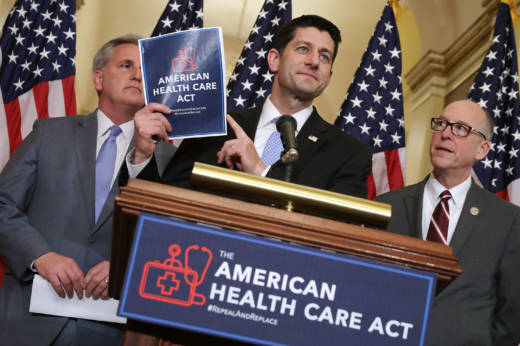The revised Republican bill to repeal and replace the Affordable Care Act will leave 23 million more people uninsured over the next decade than if that act, also known as Obamacare, were to remain in place. The GOP bill would also reduce the deficit by $119 billion.
That's what the nonpartisan Congressional Budget Office reported on Wednesday in its latest score of the American Health Care Act. The CBO's assessment raises potential concerns about the bill. The agency reports that the bill could destabilize individual insurance markets in some states, leaving unhealthy Americans unable to buy insurance. The CBO also notes that the AHCA could mean some Americans would buy coverage that doesn't cover "major medical risks." Because of those policies' skimpy coverage, the CBO doesn't count those people as insured in this report.
The fate of the bill rests in part on this score, as House Republicans passed their most recent version of the bill without waiting for the CBO to report the bill's estimated price tag. Three weeks after passing the bill, however, they have not sent the bill on to the Senate yet, because budget rules dictate that if its deficit savings did not reach $2 billion (and that $2 billion had to come from particular spending categories), the bill would be dead upon arrival in the upper chamber.
The deficit reduction in the latest version of the bill represents a decline from previous versions. When the CBO first scored the AHCA, it said the plan would save $337 billion over 10 years. Later revisions reduced those savings to $150 billion.
By far the biggest savings would come from Medicaid, which serves low-income Americans. That program would face $884 billion in cuts. Cutbacks in subsidies for individual health insurance would likewise help cut $276 billion. But those are offset in large part by bigger costs, including the repeal of many of Obamacare's taxes.
